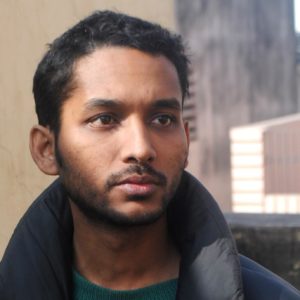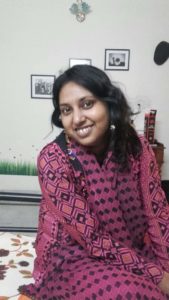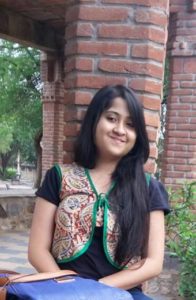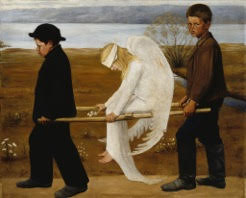Sanghamitra Halder
Light- Gloom
I feel to say, you grow up
Grow more, overcome this shoulder
The way an insignificant insect walks through
I see the insect walks just like that
So innocent
As if no one has been ever marked present in this earth
As if this earth will be pregnant now
I discover myself in the lashes of that wish
The siren in the brain appears, with its legs wet
Nah
Nah, this is not such an emotion
That you may treasure it in a box
I only know
I have no eligibility to go into the crowd
Never had the eligibility to be solitary as well
I feel a twin today
There is a sapling coming out of me
That journey doesn’t end in the eyes
They would go for a walk wherever the eyes wish
Lost home
I would go home – there is a remembrance in these words
The healing of people’s depression and
There is an ancient entwined house too
A wild bird hidden in a gentleman’s breast
As if I want to be separate and alone
From your gatherings at the very first chance
As if I want to be the referee of the sandalwood grove
Who has become a legend by being rumoured
Hey…
Who else mesmerizes all day long
Tell me, who else is there except you
This journey from who to whom
Water overtakes the veins
Obliterate these healing nerves if you can
O unknowing, take me to your wonderful unknowing
Bring me to your passion face to face

Sanghamitra Halder is a Bengali Poet and non-fiction prose writer. Born in Kolkata, 1984. Studied Master of Arts in Bengali Language and Literature. First poem published in 2004. Till now she is the author of four Bengali poetry collections — NAAMAANO RUCKSACK (2010), DEERGHO-EE (2014), HEY EKTI SAMBODHAN (2016), ANUPOSTHITIR SHABDO (2017) and a collection of literary prose writings – RANDHANSHALAR SHIS (2017).
Email: sanghamitra.h@gmail.com
Indranil Ghosh
PET PEGASUS
I gain light’s myriad
Its delay, sleeping greens…
All my sudden leaps into the world
Are but stitches of Pegasus that never end
Only the noblesse of threads
Smokes on
Cater the nursing cocoons
Gently I adapt to this sway
Of cocoons path to butterflies.
Translation: Debadrita Bose
FOOTSTOP
Gaming nation around the window sill day all
Discourses of shivering rivers in colored threads…
Shrinivas hears the road
Listens the feet with his stethoscope
The road is seated with her vulva scattered
After ejecting a flood –
I just can’t stand the vivid vertigo
The wintery cardio beating
Shrinivas to his father
To a greater father
This whole tree is melting shadows
Over the earth
Translation: Kaushik Chakrabarty
THE CITY
The Queen builds the storey up on the Queen
Long songs of oarsmen
Along the lighthouse
On floats the caresses of collapse
Ocean has made us older, Shravanti
Tales of many a princesses grew on skin
Seeing a body I feel smearing it
With milk and honey
O-mah-body
O-body-de-la-mine
Let’s sail Arabian Nights
The translation of long queue of eyes
Has turned waters…
No rain. Not raining. I am
thinking why it is not pouring
What about crops
Half open feet as in half closed leaves
What ‘bout ‘em?
Our journeys
Would grow in luminescence
Moon would meed
The wife would feed
Cattles shall moo in the sheds
This is the way
House is full
Our births are whispered into the ears of the uterus
Ho Ho Uterus!
Doesn’t it feel like
Her highness has opened the door?
I feel Shravanti’s palm is a nice boat
When it returns
I look for fish
Fresh new fish
Jumps out and Shravanti gets married
Dumb light
That handicapped city is stuck by the sleep
Let’s fill water from the tube well
Let’s put up windmills
Let’s stitch freedom on flags—
The national anthem of the Dumb
Miles of darkness boiling in a pot
City feels the sea…
Translation: Nabendu Bikash Roy and Debadrita Bose

Indranil Ghosh, author of three volumes of poetry (Ratre Deko Na Please, Julywala, Lokta Pakhi Ora Niye Bolche) is a notable Bangla poet of the zero decade. A post graduate from IIT Kharagpur, Indranil left his job and business in order to engage more devotedly to literary works. Besides poetry, he is also a prolific prose writer. His novel ‘Search Korchen Debanjan’, published in 2015, deals mainly with reader response theories. Indranil’s latest work ‘Nulor prithibi o onyanyo galpo’ (Nulo’s world and other stories) is a collection of his stories, published in 2016. He has been an associate editor of the Bangla Little magazines ‘Boikhori Bhaashyo’ and ‘Natun Kabita’. He is the founder and publisher of Indiaree – a multilingual online journal.
Anupam Mukhopadhyay
My Religion
This rib cage. Without meadows. Without grass there isn’t any poem. Love. Water. Hinduism. These 3 words or a broken bone in my dreams. My dreams are changed when I turn around. A railroad and a pale blade of grass mesmerize me. ‘Secular’ is the word now more horrifying than ‘zihad’. Trying to make a perfect rhythm with the universe. I wash my hands. wash my face. Surmising. I am a solo flute. Steadfast curious flute. Disillusionment is my stable. Whoever gave me a drop of water I addressed her as my mother. I’ll never go from here. I’ll beg for my fad not for necessity. I set the fire beside the river bank and listened to the smiling wave of a hyena. Neither the word ‘NO’. Nor the word ‘YES’. Through the smoke I listened. All those trustworthy pygmy-villages. I feel myself tall and it’s my religion.
(Translated by Shanu Chowdhury)
Don’t Worry Syed Karim
Salute him. The rock will kindle. If you want to break the rock aim your rifle at the heart of it. This text is my statesmanship and a warfare. Don’t try to find a chord, the text may burst out like a filthy sun & scatter over the chaotic borderline. The darkness is restored in the core of heart more than death. Incoherent power of taste. Improve it with a mint. Lame feelings could bend your bayonet. Banned literatures is more dangerous than a captivate Negro. The editor washes his vocal cord. The saliva is thrown away from the portico of life. The pillar is overwhelmed. Bow him. The editor controlled himself. Try harder. The surface is ruptured. The air is uprooted. Red tiles. Peace of a white wall. A green window. The house underneath a hill. My coldness either stayed in that house or in a warm dream. That house. That land. Not for all. Syed Karim. Two words come from the adjacent graveyard or an old, ancient Persian village. Name Syed karim. Or. In the the British era he knew the Thacker & Spink’s shop. Whatever. A sad cock wakes him up in a wrong night. That. Hold his collar & force him to say ‘wow’. Just like a tamed tiger.
(Translated by Shanu Chowdhury)

Anupam Mukhopadhyay was born in 1979. He lives at Ghatal, a small town of West Bengal. Anupam started publishing his poems in 2000. He has seven books of poems to his credit.
Paulami Sengupta
Maximum Love in Patel Nagar
Don’t tell me we need to take part in ‘The Maximum Love’, Love!
How will our loves
be a series
For the prime time slot
When the entire Patel Nagar is battling for life with remote controls?
They have sent the camera?
Okay then.
At 7 pm
I remove salary and elation like a belt
And throw in half a marathon and salt
The little shopping we do
To feel buoyant
So much love for the work
That creaks with the rundown rickshaw
And combs through the late dal
I cook
Yes, I cook, I cook
Whip up things
Sugarless doubts for you
Every night
Maximum
Extra large emotions grazing, love!
Chomp Chomp
Mark
Arms glisten like sand
Eyes look away from faces
Knees go berserk
Heels ready for arrows
This Friday
I whip up frothy spirits and pose touristy, liberated.
My fancy for Maughm
seclusion, sloth, peninsula
is dry and salty.
If you remind me
About two wars
And a prison
I finish off the pamphlet
In five minutes
Savour beaches
Like slices of coconut
Stare at bunkers
And ferry across river banks as if they were my own.
Then I share pictures of clean, clean slates
Can you see the mark on my left arm,
An island in this island?
Hungry
The air smells of oregano and mud.
Opposites spot each other and chatter— about things other than monsoon.
I turn away from the symmetry of these roadside shops to bite into neat slices and gobble up words with oil.
My own edges being rubbed on.
After bathing
After bathing
My limbs were tranquil.
I combed through old mornings—deftly.
I returned.
On seeing a quiet pool and a door closed,
thought for a while and sprinkled talcum powder on my neck.
(Translated from Bengali by the poet)

Paulami Sengupta is a publishing professional based in Delhi. Her poems (in English and Bengali) and translations have been published in Muse India, Nether, Kritya, Indian Literature, Parabas, The Sunflower Collective and Cold Noon. She has a collection of Bengali poems titled Jiwhai Barbar Fire Ashe Laban (2007).
Arnab Roy
Composed for the Child – 1
After collecting the shadow of his child, the man,
head-down, is now leaving the house.
He is travelling to the other side of the senses.
He has overheard that his child has learned,
‘Papa, Nowhere’.
After such coinage of words,
he cannot cast any shadow anymore,
There is no one to call after him.
A rage has engulfed his home.
There is no one there to slap him back
to his senses anymore.
He had the vision once, a boy, like a new leaf, O dear…
That leaf is now floating on someone else’s wind.
He has searched hard, what metaphor can be used
to compare this…
the leaf rested on his shoulder once for a while.
What else does one need to wrap oneself up?
Now, as he is walking, picking up all his own footprints as well.
If ever he could have put any colour anywhere,
An echoing ‘Nowhere’ is erasing them all.
Composed for the Child – 2
Strolling from one nothingness to another,
the child, now can be seen standing,
in his blood, life circle, in his lush green,
the world swings, his dollhouse is spread
from this to the farthest corner of this universe.
Putting his steps, his new steps on the stars ,
he halts for a while, unconsciously,
calls, ‘DAD’,
then corrects himself, ‘not here, not here’.
The sky stands still,
thinks, with his azure vastness, what’s the use?
Why do we even try to be liberal, or pose to be?
Rather it is better to fall down with all the emotions
within the chest, like a fragile glass wall.
It is better to fall down and be into pieces.
Composed for the Child – 3
Composed for the children only.
Composed for the children only.
He has lost his inner child into his father.
He has forgotten his inner child somewhere in the heap of toys,
Somewhere in his absence of mind, the boy
has transformed from one child to another and
finally into a whole lot of children.
In a more common tongue, this is what we call being lost,
these are the words that brings sigh on the
high boughs of the tall trees,
and the girls go to picnic to the open riverbanks ,
to become immaculate again—
Therefore, such goes the notice,
‘FATHER SERIOUS (STOP) COME BACK’,
and hanging that up
like a few winds on the lonesome mailboxes,
or like nailing the leaflets on the horns of the buffalos grazing early,
or like planting into the seeds of the favourite fruits of the birds.
Thus, one day, covering the sky and the earth,
on the seeds and on the tree barks.
on the snails and on the galaxy at the same time,
words will appear.
I hope he will be able to read by then.

Arnab Roy was born on 9th December. 1982 at a provincial town names Malda on the northern part of West Bengal, India. He was then raised at various places of Bengal at various stages. He has done his graduation from Kolkata and his masters from Varanasi. He now teaches in a school at another provincial town of West Bengal, Raghunathganj. He has two collections of poems, namely, Rwiju Chilon Bismito Sorol (can be crudely translated Upright Smooth Surprised Simple) and Korunasomogro (The Pity Omnibus may be) to his credit. He has also published a collection of short stories so far.
Souva Chattopadhyay
Passing Over in Silence
1.
The house was locked. A while ago,
we came back, after spending a week
in the mountains. As soon as we entered
the house, it seemed that there had been a storm,
perhaps rain. Perhaps, we had forgotten to close
the bedroom window, and the floor was now sloppy
with dank water, dust and debris.
I was shaken, by the shadows of a calamity,
so distant, attacking me like this
in my own house. Muniya, however, was calm
and patient. Promptly, she started cleaning up.
Later, in the balcony, it was Muniya, who discovered
the bird’s nest, completely ruined now. There were
broken eggshells too, and remains of yolk,
yellow and sticky, scattered all over the place.
2.
You know all my secrets. Although,
now I doubt, if I was able
to explain everything properly to you.
Otherwise, how can you laugh so casually,
while listening to things so serious?
How can you switch off the lights and go back
to sleep so peacefully, beside Ruba’i?
I am scared now. Now, I cannot stop talking.
In this darkness, my own voice
is the only identity I have.
Of course, you know, by sound
how we can measure distance as well.
3.
From the balustrade of this fort, I can see
those little houses, people’s
unkempt lives. Is there something else in this,
too? In cold nothingness, in the faintly lit sky,
pigeons, flying in circles for a while now,
have started settling, at last, on the square roof,
a seemingly vast pool of coppery dust.
I can hear a faint music now, a song
in an unknown tongue, quite touching.
Perhaps all these efforts, all these hearty
humane endeavours, will not go in vain.
They look pale and sickly though,
under this strange evening light.
4
Once, looking from afar, I found the earth
quite familiar. It was almost like my grandma—
calm, a little dishevelled, and her dress
always falling off her shoulders.
Under those clouded eyes, I could see flickering
shadows of an endless evening, her cracked toes
filling up with soil and gnarled roots.
Whenever I came closer to the earth, I could smell
her soft, unwashed clothes. From my window,
I could see her face, like a forgotten portrait,
dark, grimy, and moth-eaten.

Souva Chattopadhyay, born in 1983, authored three books: Anantar GharBari, Hatighora O Onyanyo, Muniya O Anjaan Byuha and Mayakanan. He is now based in Delhi.
Pushpanjana Karmakar
Cupboard of Ecstasy
There are no clothes
in the closed cupboard.
A dormant volcano
of cut-outs of clay, moss, shiuli flower, dog-eared Woolf books
pictures of insufferable refugees and a love dialect curated into cactus.
There is Kant’s pathological love
Pounding at my door’s hinges
Rising from it are:
Dakshineshwar’s night Ganga,
Calcutta’s tongue of ecstasy.
The overzealous bare bodied child
ready to immerse my coiled prayers,
where I never find myself
except foreboding hung by my family
on the walls of our house.
His hands filled with cotton
draping my absence into a red dream of hibiscus.
My body falling on him like a fish net cast on sea.
The matted-hair boy
getting drenched in first rains at Sealdah station
dancing without body
His feet: running through faith-ribs of my heart
dropping like a falling frangipani flower
I feel free, sustained
In that cupboard
as though I care more for smoke than fire.
In that cupboard they remain
Like a dream surfacing
Love restraining with a bolt.
Wall Beyond
In this grueling silence
The plumber mustn’t mend
The leaking tap
Allow it to pitter-patter
in kernel of my brain.
The thud of predator-anxiety
The dead at the door
Coughs up the pigeon
All set to flutter
And loosen threads of hearts lost in
weighing predicament to laughter
The serpentine sun tunneling
Into my room on a winter afternoon
Feeds me venom of warmth
It is a deep, baritone silence
Calling me into detention
Of
Withered love
Nut-hard anger
Deep-buried loss
and an oblivion-
so much an ordinary conduct of life.
II
In this silence
Corrugated sheets are beaten
To take a shape
Of my heart
When fear enters my armpits
A forgetful, dazed dancer storms into my heart-pit
I detached, bemoaning.
The eye behind eye-a gaunt lizard –
Lay in wait
For the next butterfly dance step
From dark waters of Dakshineshwar Ganga
Dragging me to
Currents,
Where time is a swirl
of arriving and retiring without my consent.
And in that wintry silence
Pain is: time building carcass before its body
Love is a ruin in harmony.
Memory
Memory is a firetender
Scaling up facades
Rescuing anecdotes, whims, a sight, a lover, a hard bone betrayal
From the blaze in hippocampus.
Why do we remember whims?
Memory is a gurgle inside the mouth
Swishing agony of past.
Each life inside the mouth-cave
Is a bird at dusk
Returning home, ending its restlessness to fly.
Memory is a froth
The newest bubble snaps the previous
In the bartender mix
Of a sentiment.
Memory is a rain-dyed road
Phalanges of wet leaves
Leading us to
life’s habitual despair.

Born and raised in Kolkata, Pushpanjana Karmakar has contributed poems to magazines like The Harvest Millennium, Kritya, and Poetry India: Enchanting Echoes (All India Poetry Competition), Coldnoon Poetics and one piece of fiction to Indian Review and The Bombay Review. She currently resides in Delhi and works as a corporate lawyer. Her article on corruption bagged a writing contest conducted by Times of India. She is a part of a poetry group Moonweavers in Delhi. She likes to read works by Rabindranath Tagore, Amitav Ghosh, Anita Desai, Dom Moraes,Virginia Woolf, Italo Calvino, Haruki Murakami, Fyodor Dostoyevsky. In pursuit of discovery of the core of a human heart, she likes to portray the unspeakable wrench stirring souls of a human being. She examines laughter and the lack of it.
Rangit Mitra
Sound –
My throat is woven by trees
as I lay myself
on a dry desert like bed.
I am appalled
by the absence of sound
I am nibbled
by the absence of light.
Death
is now peeping at outside clamour,
through the
barbed shadows of darkness.
Gentlemen
Educated they are, Gentlemen,
belong to a different world.
Their failing make-up,
Their white-collared circle
are not part of my self,
Yet, I have become one of them
as I tried swim against the wave.
Gentleman, is my shame name.
j
Blue
Bare body lies like a dry barren
valley of nature
spreading its layers of excitement.
Fearless age is sitting beside nudity,
as Carnal intentions helping
courage to grow, defying mercury.
I never allow the other man to grow
as I burn him during our face-off
laced with poison of mistrust
His body has now turned into blue
At Last
Nobody bears goodness.
Because you always prefer those
Who are not good.
Defying stunner and words of ethics
that Gujrati family has reshaped into
a line of poetry.
(Translated by Mriganka Majumder)

Rangit Mitra, born in 1985, is the author of three collections of poetry: Rumale Beer’er Gondho, Bhalo Pagoler Astana, Columbuser Loading Stone.
In this link in N. 2 of The Dreaming Machine, you can find Part I of this project, initiated by Aritra Sanyal, with poems by Animikh Patra, Anuradha Biswas, Himalaya Jana, Anindita Gupta Roy, Raka Dasgupta, Ritam Sen, Swagata Dasgupta.
In this link you can find the essay “Zero Circle without a Centre: the Generation of Poets Writing in Bengali After 2000” by Aritra Sanyal, providing a framework to better understand the generation of poets, in their 30’s writing in Bengali.
Cover image: Photo by Aritra Sanyal.





















































